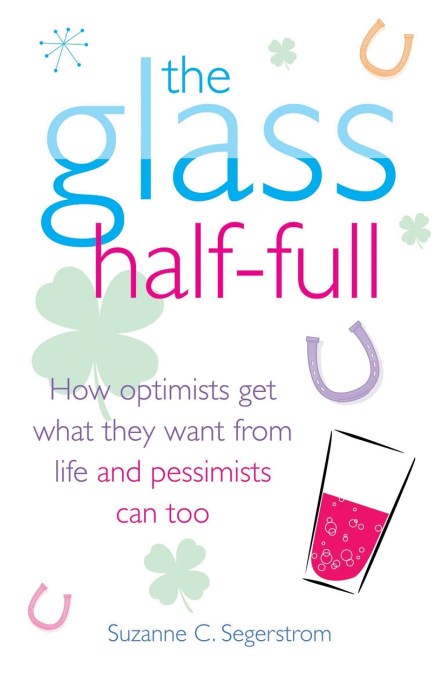Rose-colored glasses may look silly, but they’re actually quite practical.
In The Glass Half Full, psychologist Suzanne Segerstrom surveys the scientific data on optimism (including her own award-winning research) to reveal that it’s not what you believe about the future that matters, but what you do about it.
While pessimists debate whether their goals are attainable, optimists are out there trying to achieve them. Without insisting that you learn to “think positive,” The Glass Half Full teaches you practical ways to appropriate the habits and skills that optimists use to get what they want from life.
Segerstrom – who reluctantly admits her research on the topic has transformed her into an optimist -imparts the lesson with a mix of humor and intelligence that will convince even the most cynical readers that a brighter tomorrow might be just around the corner.
In The Glass Half Full, psychologist Suzanne Segerstrom surveys the scientific data on optimism (including her own award-winning research) to reveal that it’s not what you believe about the future that matters, but what you do about it.
While pessimists debate whether their goals are attainable, optimists are out there trying to achieve them. Without insisting that you learn to “think positive,” The Glass Half Full teaches you practical ways to appropriate the habits and skills that optimists use to get what they want from life.
Segerstrom – who reluctantly admits her research on the topic has transformed her into an optimist -imparts the lesson with a mix of humor and intelligence that will convince even the most cynical readers that a brighter tomorrow might be just around the corner.
Newsletter Signup
By clicking ‘Sign Up,’ I acknowledge that I have read and agree to Hachette Book Group’s Privacy Policy and Terms of Use
Reviews
Suzanne Segerstrom is a rising star in the new science of positive psychology, and this book shows why. Written in very accessible and engaging prose, it integrates shrewd insights with the latest research findings on the healing power of optimism
The message in this book contradicts many popular myths and is based on the scientific study of optimism. Dr. Segerstrom shows us ways to change our lives to become healthier and more fulfilled. In a world awash with misinformed pop psychology, this scientific recipe for the good life is a breath of fresh air
This is a knowledgeable and witty book that delivers the science of optimism in an informed and accessible manner

